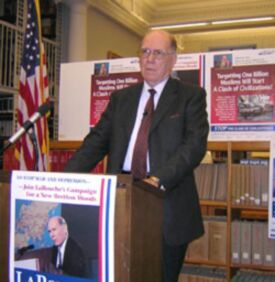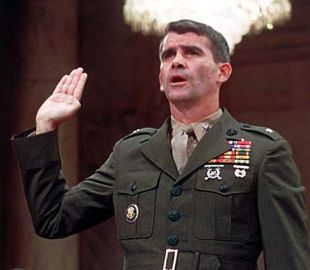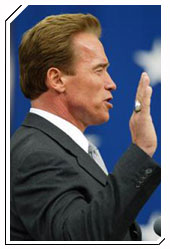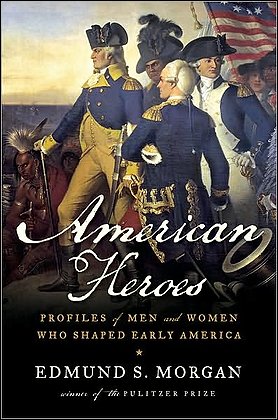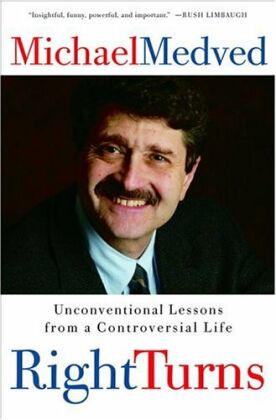Beast-Man Politics
From The New CriterionIn late December and early January, the repose of my study was disturbed by a sound-truck belonging to Lyndon LaRouche — sometimes on its own, blaring beneath my window, and sometimes as part of a minuscule procession, a pathetic gaggle of LaRouche’s lunatic supporters. On one occasion there was a flat-bed truck with half-a-dozen people standing on it and beating their breasts against the cold — or possibly for joy — while purporting to represent “the LaRouche youth movement.” Someone banged a drum and all cheered to the strains of the Hallelujah Chorus, blaring through the speakers. On the side of the truck was a banner which read: “Dump Cheney, Vote LaRouche” — which to say the least of it shows an imperfect understanding of the way our electoral system works.
You would think young people, especially, would be ashamed to make such a public spectacle of themselves, but like derelicts mumbling to themselves in the street, like LaRouche himself, they seem to take a grim satisfaction in their isolation and unpopularity, as if the repugnance with which the common opinion of their fellow-countrymen regards them were itself an infallible sign of the correctness of their views. A moment’s attention to these, as revealed on the website LaRouchein2004.net, is all that is required to understand the nature of the paranoid delusions under which this convicted felon suffers. His political opponents are to him “fascist scum,” and he is particularly wroth, for some reason, with Vice President Dick Cheney, whom he seldom refers to without the epithet “Beast-man”and whom he calls “the self-anointed Grand Inquisitor of the Bush administration.”
Others caught in the spotlight of one of LaRouche’s ferocious hatreds include the House of Representatives Majority Leader Tom DeLay (“a freak salvaged from Washington, D.C.’s political equivalent of ‘Skid Row’. . .a ‘zombie-like’ synthetic personality taken over by something like the psychopathological equivalent of ‘the body-snatchers from outer space’”), Newt Gingrich (“an incarnate, Phrygian-capped dionysiac en route to establishing a fascist (e.g., Napoleonic reactionary tyranny) in the U.S.A.”), the late “fascist philosopher” Leo Strauss and all those, such as Richard Perle (“fascist scum. . . former errand boy for the Senator from Boeing), deemed to be his followers — as well as, oddly, George Soros, who certainly seems to hate the Bush administration as much as LaRouche does but who, unlike him, also advocates the legalization of certain hitherto illegal drugs.
At 81 and fresh from the publication of Children of Satan II: The Beast Men, yet another of his pamphlets purporting to reveal the connections between the Spanish Inquisition, the French Revolution, the Third Reich and Dick Cheney, LaRouche was running in the Washington, D.C. primary for the Democratic nomination for the presidency. If you didn’t otherwise know he was a fruitcake, that would tell you, since the primary is not only non-binding but officially shunned by the Democratic National Committee and all the major Democratic candidates save Howard Dean, since it is in violation of the party rule that no primary shall be held before New Hampshire’s. But perhaps LaRouche thought he had a chance to streak past the likes of Dennis Kucinich and Carol Moseley-Braun and finish second to Dean. Of course, that didn’t happen. Instead, it was the Rev. Al Sharpton who got this much coveted bit of electoral momentum going into Iowa and New Hampshire.
All LaRouche succeeded in doing was disturbing the peace of the city for some weeks to no particular end but the gratification of his own conceit of himself as a “leader.” During that time, he began all his campaign announcements, even those by the sound-truck, with the words: “This is Lyndon LaRouche, candidate for Democratic party nomination for president. I have approved the following message” — as if we were all as paranoid as he, so that it were necessary to forestall the suspicion that he might be reading a message he had not approved. The idea seemed to be to convey the impression that he headed up some vast organization where eager underlings were constantly producing shiny new policy statements to his specifications and bringing them to him for his approval. Naturally, he assumes that prestige attaches to having someone else write his words for him, rather than to writing them himself — which one assumes he actually does, since they all sound alike.
Yet in a way LaRouche is precisely the visionary he imagines himself to be, for it is obvious that, although he himself may never be elected to anything, his day has come in American politics. This is not just because it is possible to hear from many of the more sane and respectable Democratic opponents of the Bush administration language very similar to that of the LaRouchians’ warnings against, as they put it, “the Straussians’ commitment to transform the United States from a democratic republic into a tyranny, using the events of Sept. 11, 2001 as their ‘Reichstag fire,’ to justify the overthrow of our Constitutional system.” Conspiracy mania, though usually kept just off-stage, has long been a temptation for parties out of power in America, and it all tends to sound pretty much the same. But conspiracy mania is flourishing today as it has seldom done before, and not just at the fringes where the mainstream press would once have disdained to venture, because the standards of discourse have been cut free from their moorings in a common culture. As a result, anyone can say anything.
To be sure, free speech being guaranteed by the Constitution, which is as-yet unoverthrown, anyone has always been able to say anything. Or almost anything. But mostly anyone hasn’t. Or anyone who wasn’t an obvious addlepate like LaRouche. The customs by which political debate has remained subject to certain restraints of manners, reticence, respect for one’s opponents and democratic forbearance seem to me at this stage of the campaign finally to have worn away. The advocates of this candidate or the other are generally supposed to have the right, in honor and decency as well as in law, to say anything they think might be useful to their man — or, in the case of Ms Moseley Braun, woman — without any rebuke from the bench, which is to say the media, for wasting the court’s time with absurd, speculative or tendentious pleading.
Instead, the media are happy to join in with such pleading by giving a ready forum to anyone this side of Lyndon LaRouche who is prepared to say anything colorfully insulting about the opposition, the more provocative the better. Even LaRouche finds his money as good as any other candidate’s for paid advertisements. In the American marketplace of ideas, lunacy is a commodity like any other. Those, like the poor enthusiasts of the LaRouche youth movement, whose meagre intellectual purse doesn’t run to complex economic, diplomatic and legislative arguments may still want to purchase a shoddily constructed conspiracy theory or two to see them through an election year. And, after all, how much different is LaRouche’s contention that, under Bush, the nation is ” bankrupt, depleted, ruined” from the more up-market Dick Gephardt’s repeated insistence that the president’s tenure has been “a miserable failure”? The one is about as plausible as the other.
True, the radio and television stations who accept LaRouche’s advertisements must know that he is crazy. But who, they may ask, are they to set themselves up in the place of proper mental health professionals — especially when there is money to be made? Anyway, running LaRouche ads is in essence no different from the news shows that haul out deliberately provocative commentators. Indeed, the voices belonging to such ornaments of our national intellectual life as novelist and belle-lettrist Gore Vidal, linguist-philosopher Noam Chomsky, film-maker and best-selling author Michael Moore, comedian and best-selling author Al Franken, actress Janeane Garofalo and spy novelist John LeCarré are scarcely to be distinguished from LaRouche’s — in substance if not in style. Mr Vidal and Mr Chomsky suggest that the Bush administration is itself implicated in the terror-attacks of September 11th, while Mr Moore believes that it knows where Osama bin Laden is hiding but chooses not to capture him in order to stoke war-fever.
There was a minor kerfuffle recently when MoveOn.org, a website lavishly supported by Mr Soros, ran a contest for anti-Bush ads and got one which compared President Bush to Adolf Hitler and claimed that “1945’s war crimes” were “2003’s foreign policy.” But the attention this outrageous charge attracted seemed mainly owing to the fact that the site’s managers were somewhat embarrassed by it. Elsewhere on the left, such language was unremarkable and pretty much unremarked except by those who sought it out and presumably agreed with it. Vidal, for instance, said in an interview that “the Patriot Act was “as despotic as anything Hitler came up with.” He goes on to say, like LaRouche again, that Bush has “wrecked the economy” from sheer stupidity and will certainly be swept from office in November unless his henchmen are successful in what is sure to be an attempt — or another attempt — to steal the election.
With such lurid fantasies of deep-laid plots by those in power to subvert American democracy hovering just off-stage during the election campaign of 2004, the candidates need to make little effort themselves to associate themselves with such dark imaginings. Howard Dean, the Democratic front-runner for the presidential nomination at the time, said that the Vidal-Chomsky hypothesis about Bush’s involvement in 9/11 was “an interesting theory”, even as he disclaimed belief in it. Senator Bob Graham, before he dropped out of the race, went even further in claiming that Bush, though not a witting accomplice of the hijackers, was criminally culpable in their success while General Wesley Clark claims that the president, whom he calls “a reckless, radical, heartless leader” must accept the blame because he “didn’t do his duty” to prevent the terror attacks. John Kerry, meanwhile keeps insisting that he only voted to authorize the use of force in Iraq because he was deliberately deceived and lied to by the administration.
There are plans for Showtime to run a reality-TV version of the election next summer, but real reality has already overtaken TV reality. Already the echt candidates are behaving like the contestants on American Idol or amateur night at the improv and hoping that their song or routine will be the one chosen as nearest resembling that of the real thing. One of them may eventually come up with an election-winner like Bill Clinton’s description in 1992 of the mildest of the post-war recessions as “the worst economy in the last 50” — or was it 60? — “years.” One of the consequences of this free-for-all in which no assertion is too outlandish to be paraded in front of a mass audience in hopes of its approval is that those who really are trying to understand the matters at issue suffer a disastrous loss of self- confidence in their ability to do so. Writing in the London Daily Telegraph, the columnist Barbara Amiel made a shrewd point about the obscurity of the scientific language in which policy matters such as the Kyoto Protocol are couched — so that “it is no wonder that most people judge the value of Kyoto not on its merits but according to their feelings about George Bush.”
Yet the same could be said about almost every other matter of national and international concern. What about the Bush-sponsored prescription drug benefit which extended federal entitlements to the elderly well beyond the point which many in both parties thought fiscally prudent? Yet at a Howard Dean fund-raiser in New York, Miss Garofalo called it the “you-can-go-f***-yourself-Grandma bill.” Huh? Oh yeah. She just means that she hates Bush. But isn’t it odd that she attempts to justify her hatred by saying that his pushing for the biggest entitlement program for the elderly since Medicare amounts to you-can-go-engage-in-sexual-intercourse-with-yourself-Grandma? It might have made some sense if she had said it was the you-can-go-etc.- Junior bill. But she is no more interested in real political argument than her audience. She knows that her fellow-Bush haters are not looking for reason, just more Bush hatred. Hence, too, the paucity of voices among even the most respectable Democratic candidates raised against the Hitler comparisons of MoveOn.org and others.
If it were just a few empty-headed celebrities who were reciting the anti-Bush litany of complaint it would hardly signify, but now that the custom of the country is that anyone can say anything about an opponent, political discourse has been drained of any real content. No thinking person expects any presidential candidate of either party to say anything worth listening to: everything has been carefully scripted and managed and calculated by some handler or speech-writer who has focus-group tested it on morons. The signs are instantly discernible. When Senator Joe Lieberman went on the “This Week” show with George Stephanopoulos and mentioned the words “extreme” and “extremism” and “extremism in both parties” repeatedly, you knew that some spin-doctor had figured out that ostentatious centrism, regardless of any specific measure to be centrist about, was a good niche for him — even if it wasn’t a good enough niche to win him any Democratic primaries.
In Errol Morris’s recent documentary about Robert McNamara, The Fog of War, the former secretary of defense in the Kennedy and Johnson administrations, now 87, says that during his time in government he “learned that you never answer the question that has been asked of you; answer the question that you wish had been asked of you.” Whether he knows it or not, that has been the standard advice of those who administer “media-training” to public men for a generation. But now we seem to be seeing the revenge of the questioners, since interviewers and commentators of the “media-savvy” public figures don’t pay any attention to what they say either. Or so I infer from an interview with Senator Kerry on “Meet the Press” in January. Attacking the Republicans with a frequently-used but dubious instance of their viciousness of attack during a recent senatorial election campaign against the Democratic incumbent in Georgia, a wheelchair- bound veteran, Kerry said: “We saw what they did to challenge the patriotism of Max Cleland, a triple amputee, a man who left three of his limbs on the ground in Vietnam. They challenged his patriotism. His regret is he didn’t stand up and fight back.”
Well, I guess it was! Imagine the fuss that would have been made of such a remark if the President had made it, or poor old Dan Quayle, hounded out of public life by the media for misspelling “potato.” Likewise, the media looked with indulgence on Hillary Rodham Clinton’s attempt at a joke when she identified the late Indian leader Mahatma Gandhi (d. 1948) as the proprietor of a service station in St. Louis. One is inclined to detect just the hint of bias. Yet there may be another explanation for the fact that Kerry’s interviewer, Tim Russert, didn’t bat an eyelash. He wasn’t listening. And why should he? Kerry wasn’t listening to him.
Employing what the Washington Post the same day described as “his merciless journalistic skills to pick apart the policy statements of the Democratic presidential candidates,” Russert had also attempted to point out to Kerry the contradiction between his saying that Bush’s occupation of Iraq was “creating more terrorists” and his criticism of Howard Dean as not having “the judgment to be President” for saying that America was no safer for the capture of Saddam Hussein. “But, Senator,” said Russert, “you can just hear the Republicans saying, ‘John Kerry said if he was president, we would not be in Iraq, and that there are now more terrorists in Iraq, despite the capture of Saddam Hussein. Therefore, John Kerry does not have the judgment or the credibility to be elected president.’ You can hear the Republican commercials.
To this Kerry replied: “Tim, this debate — no, because if you look at what I said, in the fullness of that interview, Tim, as well as in every other interview that I’ve ever had, I have said we have to hold Saddam Hussein accountable, but I’ve also said we have to do it in a way that is smart and legitimate.” Russert must have thought that such a laughably feeble answer — what on earth did the Senator mean by holding the ex-dictator “accountable” if it precluded making war on him? — settled the matter. Or else he was not listening. The previous week, he had interviewed General Clark on the show, who blandly asserted that, had he been president, he would have caught and captured Osama bin Laden in Afghanistan. An easy thing for him to assert, you might think. And yet, once again, Russert had no riposte to a weak answer to his question: “How are you so sure you could have done that?” Clark’s rambling reply ran, in part:
what I would have done before I started the operation in Afghanistan is look for a success strategy. After you’ve had experience with military planning and the way political military actions operate, you know that you have to start at the back end and work forward. So it’s: What are the conditions you want to have achieved when the operation’s over? What I would have said is, “We want to take the Taliban out of power and we want to bag Osama bin Laden and the top leadership in al-Qaeda.” And then I would have directed the military to plan for that result and work backwards to when do you start the operation, how do you open the operation, and so forth. I don’t think that was done in this case. I think in this case, they started at the wrong end of the operation. The president reportedly said, “Hey, I want bombs falling within 30 days.” He wanted to have a perception of action. He didn’t have a thoughtful, effective plan to deal with the threat of terrorism. And this administration still doesn’t, Tim.
In other words, he could be sure because he would have had a plan, and the administration didn’t have such a plan, or didn’t have the right kind of plan, and it wasn’t well thought through, and, well, his would have been. So there. Q.E.D. Yet Russert’s “merciless journalistic skills” were silent thereafter.
But of course he was only playing by the new rule that anyone can say anything — or at least anyone can say anything by way of criticism of the Bush administration. Paradoxically, this has meant that the administration has had a free ride among those who are otherwise broadly sympathetic to Bush on subjects — like the enormous new entitlement for the elderly and the seemingly unrestrained federal spending of which it was only a part — where otherwise he might have received serious criticism. The Republicans were circling the wagons in the same way that the Democrats did when as virulent a hatred of Bill Clinton was fashionable in some conservative and Republican circles. But that’s the way political debate will be carried on so long as each side is allowed to treat as legitimate a view of the other as beast-men.
Discover more from James Bowman
Subscribe to get the latest posts to your email.

